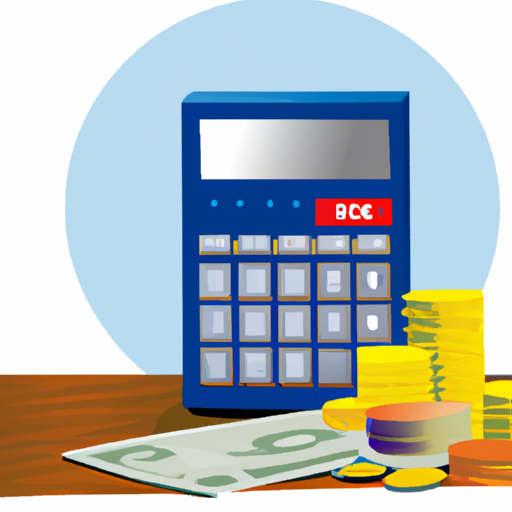Creating a Financial Plan
When it comes to starting a business as a solo entrepreneur, one of the most important elements to success is having a strong financial plan in place. A financial plan will help you stay on track and provide clarity in times of financial distress. Creating a financial plan doesn’t have to be complicated or overwhelming. With some basic steps, you can be on your way to a strong financial future.
The first step in creating a financial plan is to determine your long-term goals. What do you want to accomplish financially? Are you looking to grow your business or generate more income? Maybe you want to save for retirement or a down payment for a house. Once you have a clear vision of your long-term goals, you can begin to draft a plan to achieve them.
The next step is to create a budget. Start by determining your monthly income and expenses. Your income should include all sources of money such as business profits, investments, and any other additional sources. Expenses should include all your necessary bills, such as rent and utilities, as well as any additional costs, such as subscriptions or entertainment. Once you have a clear picture of your income and expenses, you can create a budget that will help you stay on track and reach your long-term goals.
The third step is to create an emergency fund. This is important for any business, but especially for solo entrepreneurs. An emergency fund will not only help you weather any unexpected expenses, it will also give you peace of mind. Set aside a portion of your income each month in an emergency fund and make sure it’s easily accessible.
The fourth step is to invest. Investing is an important part of any financial plan. It will help you grow your money and reach your long-term goals. Investing can be intimidating for solo entrepreneurs, but it doesn’t have to be. There are many resources available to help you get started. Research different types of investments and decide what works best for you and your financial goals.
The fifth step is to establish credit. Having good credit is important for any business and can help you get better interest rates on loans and credit cards. Pay your bills on time and make sure you have a good mix of credit, such as credit cards and business loans. You should also monitor your credit score and make sure it is accurate.
Finally, the last step is to review your financial plan. As your business grows and changes, it is important to review your financial plan and make sure it is still working for you. Make sure your goals are still the same and that you are on track to reach them. Also, review your budget regularly to make sure you are staying on track with your spending.
Creating a financial plan for your business may seem daunting, but it doesn’t have to be. With a clear vision of your long-term goals and a few simple steps, you can be on your way to a strong financial future. Taking the time to build a strong financial plan as a solo entrepreneur will help you succeed and give you peace of mind.

Building an Emergency Fund
When you’re a solo entrepreneur, setting yourself up for financial success is key to achieving your goals and dreams. One of the most important steps you can take in setting yourself up for success is to build an emergency fund. An emergency fund is a set amount of money that you set aside in case of unexpected or unforeseen expenses that could otherwise put you in a difficult financial situation.
Building an emergency fund doesn’t have to be difficult or intimidating. Start small by setting aside a small amount of money each month, such as $25 or $50, and gradually increase it as you can. If you can, consider setting up an automatic transfer for this money so that it’s taken out of your account each month without you having to worry about it. This will help to ensure that you’re consistently setting aside money in case of an emergency. It’s also important to make sure that you’re setting aside this money in an account that’s separate from your regular checking or savings account. This will help to ensure that you don’t spend the money on something else that isn’t an emergency.
Another great way to build your emergency fund is to look into other sources of income. Consider taking on freelance or contract work, or even selling some of your unwanted items online or at a garage sale. Any extra money that you can make can be put towards your emergency fund, which will help you to get to your goal faster.
When you’re setting up your emergency fund, it’s important to have a goal in mind. Consider how much money you would need in order to cover any unexpected expenses that you may encounter. A good rule of thumb is to aim for three to six months worth of living expenses, though this number can vary depending on your individual circumstances.
Having an emergency fund is essential for solo entrepreneurs, as it will help to ensure that you’re able to stay afloat financially in case of an unexpected expense. Building an emergency fund doesn’t have to be difficult or intimidating, and by taking small steps and being creative with your income sources, you can set yourself up for long-term success. With a little bit of planning and effort, you can build an emergency fund that will give you peace of mind and help you to achieve your financial goals.

Investing for the Future
As a solo entrepreneur, investing for the future is a critical part of building a strong financial future. Investing brings both financial stability and the potential for long-term growth. When it comes to investing, it’s important to create an investment plan that aligns with your goals and risk tolerance.
One smart money move for solo entrepreneurs is to diversify their investment portfolio. Diversification helps to spread out the risk, which can help you to stay on track even with market volatility. Consider investing in a mix of stocks, bonds, and mutual funds. You may even want to look into alternative investments such as real estate, private equity, or cryptocurrency.
Another smart money move is to take advantage of tax-advantaged accounts. Retirement accounts such as IRAs, 401(k)s, and Roth IRAs offer tax benefits, which can be a great way to maximize your savings. Additionally, you may want to look into additional savings vehicles such as health savings accounts (HSAs) and 529 plans.
It’s also important to stay informed about the markets and the types of investments you’re making. Keeping up with the news can help you stay aware of market trends and new investment opportunities. Consider subscribing to newsletters and following experts on social media to stay in the know. If you need more guidance, consider working with a financial advisor to help guide your decisions.
Finally, don’t forget to review your investments regularly. Regularly evaluating your investment portfolio can help you make sure that your investments are still in line with your goals and risk tolerance. It’s also important to review your investments to ensure that you’re taking advantage of new opportunities as they arise.
Investing can be a daunting task, but as a solo entrepreneur, it’s important to take the steps necessary to build a strong financial future. Making smart money moves and investing for the future can help you to achieve your financial goals and create a secure financial future. With the right planning, you can ensure that your investments are working for you.

Managing Cash Flow
For the solo entrepreneur, managing cash flow can be a daunting task. Successful entrepreneurs must be able to anticipate and adapt to changing trends in the economy, while maintaining a healthy financial standing. To help you succeed, here are some smart money moves for solo entrepreneurs looking to build a strong financial future.
First and foremost, it’s important to have a financial plan. Whether it’s a budget, a savings plan, or a debt repayment plan, having a written plan for managing your finances can help you stay on track and make the most of your money. A financial plan can make all the difference in achieving your financial goals.
Second, it’s important to be aware of cash flow. Cash flow is the difference between your income and your expenses. Knowing how much money is coming in, and how much is going out, is an essential part of staying financially healthy. Cash flow can be managed by tracking your income and expenses, and making adjustments as needed.
Third, it’s important to save money. Building an emergency fund is a great way to protect yourself against unexpected expenses. Setting aside money for retirement is also important, so you can have a comfortable future. Having a savings account is also a great way to help you take advantage of opportunities when they arise.
Fourth, it’s important to invest. Investing can be a great way to grow your money, but it’s important to do your research and make sure you understand the risks. It’s also important to diversify your investment portfolio, so you’re not relying on one type of investment.
Fifth, it’s important to use credit wisely. Credit can be a great tool, but it’s important to use it responsibly. Pay your bills on time, and don’t take on more debt than you can handle.
Sixth, it’s important to be mindful of taxes. Taxes can be a big expense for entrepreneurs, so it’s important to understand the different tax deductions you can take advantage of. It’s also important to set aside money each month to cover your tax bill, so you don’t have to worry about it at the end of the year.
Finally, it’s important to be prepared for the unexpected. No matter how well you plan, there are always going to be unexpected expenses. Having an emergency fund can help protect you from these unexpected costs.
These are just some of the smart money moves for solo entrepreneurs looking to build a strong financial future. By having a financial plan, being aware of cash flow, saving money, investing, using credit wisely, and being mindful of taxes, you can take control of your finances and build a secure financial future.

Developing a Retirement Strategy
As a solo entrepreneur, it’s important to develop a retirement strategy that will help you secure your financial future. Whether you’re just starting out or you’ve been in business for years, having a retirement plan is essential for securing your financial future and ensuring that you have the resources to enjoy your golden years.
The first step to developing a retirement plan is to assess your current financial situation. Consider your income, expenses, and overall financial health. Make sure to include any investments or assets you may have. This will give you a better understanding of where your finances stand and what type of retirement plan will work best for you.
Next, you’ll need to decide on your retirement goals. What do you want your retirement to look like? How much retirement income do you need to live comfortably? What type of lifestyle do you want in retirement? Establishing a retirement plan that meets your goals will help you stay on track and ensure that you have the resources you need to live your desired lifestyle in retirement.
Once you’ve determined your goals, the next step is to figure out how you’ll reach them. This could involve investing in stocks, bonds, mutual funds, or real estate. It may also include setting up a retirement savings account or contributing to a retirement plan. You may also want to consider consulting a financial planner to get advice on the best investment options for your retirement plan.
When you’re ready to start investing, be sure to stay diversified. This means investing in a variety of different asset classes, such as stocks, bonds, mutual funds, and real estate. This will help to protect your investments in the event of a market downturn.
Finally, don’t forget to factor in inflation when it comes to your retirement plan. Inflation can significantly reduce the purchasing power of your retirement savings, so it’s important to plan for inflation when developing your retirement plan.
By following these steps, you can be well on your way to building a strong financial future for yourself as a solo entrepreneur. Developing a comprehensive retirement strategy can help you ensure that you have the resources you need to enjoy your golden years. So, start planning for retirement today and secure your financial future for tomorrow.

Understanding Tax Implications
As a solo entrepreneur, understanding how to manage your taxes is critically important. Not only does it help you stay compliant with the law, but it can also save you money and help you build a strong financial future. Knowing the ins and outs of your taxes can be tricky, but it’s an investment that’s worth the time and effort.
First, familiarize yourself with the different types of taxes you may have to pay. This includes federal income tax, self-employment tax, state and local taxes, and any other special taxes. You should also be aware of any deductions or credits you may be eligible for. Doing your research on taxes can help you keep more of your hard-earned money.
Second, consider hiring a tax professional. Experienced tax professionals can help you identify ways to reduce your tax burden, maximize deductions and credits, and ensure you file your taxes correctly. They can also provide guidance on navigating the tax code and managing any changes that may occur throughout the year.
Third, take advantage of tax-advantaged accounts. Retirement accounts, such as a 401(k) or IRA, can help you save for retirement while reducing your current tax burden. Tax-advantaged savings accounts, such as a Health Savings Account or 529 Plan, can also be useful for managing medical and education expenses.
Finally, don’t forget about the tax implications of any investments you make. Depending on the type of investment, you may be subject to income tax, capital gains tax, or other taxes. Knowing the tax implications of your investments can help you make informed decisions and ensure you remain compliant with the law.
As a solo entrepreneur, understanding the tax implications of your business activities and investments is essential for building a strong financial future. Doing your research and taking advantage of the right tax-advantaged accounts and deductions can save you money and help you plan for a successful future.

Setting Financial Goals
As a solo entrepreneur, setting Financial Goals is an important part of building a strong financial future. It provides you with the motivation to stay focused and on track to achieving your goals. Financial Goals can range from short-term, such as paying off debt in the next 6 months, to long-term, such as retiring with a certain amount of money in the bank. Whether you are just starting your business journey or have been at it for a while, setting financial goals is essential for success.
When setting financial goals, it is important to make sure that they are realistic and achievable. Start by writing down your goals and creating a timeline for when you want to achieve them. This will help you stay focused and motivated. You should also review your goals periodically and adjust them as needed.
In addition to setting financial goals, it is important to create and follow a budget. This will help you stay on track and ensure that you are spending your money wisely. When creating your budget, be sure to include all of your expenses and income, and track your progress. This will help you monitor your spending and stay within your budget.
Another important money move for solo entrepreneurs is to create an emergency fund. This will help you cover unexpected expenses that could arise and protect you from going into debt. You should aim to save at least 3 months of living expenses in your emergency fund.
Finally, you should also make sure that you are investing for the future. Investing for retirement is important for your long-term financial security. Investing in stocks, bonds, and other investments can help you build wealth and secure your financial future.
By setting financial goals, creating a budget, creating an emergency fund, and investing for the future, you can ensure that you are in control of your financial future. It is important to remember that these money moves are not a one-time thing. You should review and adjust your financial goals, budget, and investments regularly to ensure that they are meeting your needs. By taking the time to make smart money moves, you can build a strong financial future as a solo entrepreneur.

Insuring Your Business
As a solo entrepreneur, protecting your business with insurance is one of the smartest money moves you can make. You can’t predict the future, but you can take steps to protect yourself and your business in the event of an unfortunate accident or incident.
The first step is to determine what type of insurance you need. Depending on your business, you may need liability insurance, commercial property insurance, or business interruption insurance. It’s a good idea to consult with an insurance professional to understand your coverage options and what’s best for your business.
When it comes to liability insurance, this type of coverage protects you from legal and financial damages if someone is injured or their property is damaged as a result of your business. If you offer services that require a professional license, many states require you to carry liability insurance to protect your customers from any potential harm.
Commercial property insurance is another type of coverage that can help you if your business is damaged due to a natural disaster, theft, or vandalism. This type of insurance can help cover repairs, replacements, and lost income due to the damage.
Business interruption insurance can be especially important for solo entrepreneurs. This type of coverage can help reimburse you for lost income due to a disaster, such as a fire, that causes your business to temporarily close.
When shopping for insurance, it’s important to comparison shop and look for the best value. Make sure you understand the policies and coverage you’re purchasing so you can make an informed decision.
Insuring your business is an essential part of building a strong financial future as a solo entrepreneur. With the right coverage in place, you can rest assured that you’re protected in the event of an unexpected accident or incident. Taking the time to research, understand, and purchase the right insurance policy for your business can be a smart money move and help you focus on growing your business.

Budgeting and Tracking Spending
Budgeting and tracking spending are essential money moves for solo entrepreneurs. With so much of your financial future in your hands, having a clear understanding of your income and expenses is key. A budget can help you identify areas where you can save, as well as help you better manage your cash flow and ensure your financial goals are met.
Creating a budget is a simple process, but it can be daunting for those who have never done it before. Start by looking at your income and expenses. Take into account any one-time payments, such as taxes or business expenses, that you may have. Once you have a clear understanding of your cash flow, you can create a budget that works for you.
When budgeting, it’s important to be realistic and honest with yourself. Don’t underestimate or overestimate your expenses. Be sure to factor in money that you may need for unexpected expenses, such as medical bills or repairs. Also, consider the amount of money you’ll need for personal expenses, such as groceries and entertainment.
Once your budget is complete, it’s important to track your spending to make sure you are staying within your budget. You can use an online budgeting tool or an app to help you track your spending. This will help you stay on top of your finances and keep your budget in check.
It’s also important to review your budget and spending on a regular basis. This will help you adjust your budget if your income or expenses change. Reviewing your budget and spending can also help you identify areas where you can save and make smarter financial decisions.
Building a strong financial future is essential for solo entrepreneurs. Budgeting and tracking spending are important money moves to help you achieve your financial goals. By creating a budget and tracking your spending, you can ensure your financial future is on the right track.


